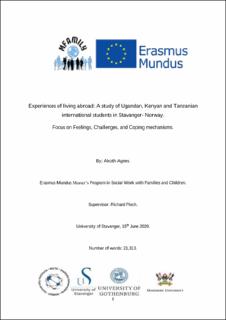| dc.description.abstract | With the increasing inflow of student migrants worldwide, there is a need for continuous documentation of students’ experiences as they live in the new environments. Therefore, this study explored the experiences of seven international students from Uganda, Kenya, and Tanzania living in Stavanger. The Focus was on how they felt living abroad, challenges they faced, and how they coped with the difficulties in Stavanger. Constructivist grounded theory, in-depth interview, purposive and snowball sampling, and thematic analysis were employed to actualize the study.
Findings showed that participants felt a sense of achievement and excitement before traveling abroad. However, upon arrival and living in Stavanger, they encountered social, cultural, financial, and emotional challenges that negatively transformed some of them into incompetent, unsocial, and unconfident persons. They felt socially excluded from activities, which made them not to realize full integration into Stavanger. Regardless, participants employed coping mechanisms that positively transformed them into independent and self-controlled individuals. Individual openness and optimism, engagement in games and sports, supportive friends, host institutions, host and home families, and Stavanger international community were reported as coping mechanisms for emotional, financial, and social support.
In conclusion, the study developed a two-phased process model for socio-cultural and emotional adjustment among participants. The first phase involved encountering difficulties and seeking familiar support systems, and the second phase involved adaptation and independence. In recommendation, there is a need to provide accessible statistics about international students in Stavanger. Ugandan, Kenyan, and Tanzanian policymakers need to facilitate the development of Information, Communication, and technology to enable effective communication between international students and their families. Host institutions and social workers have to play a lead role in ensuring the integration of international students through education and advocacy. Also, international students have to take an active role in integrating themselves into the host communities. | en_US |

